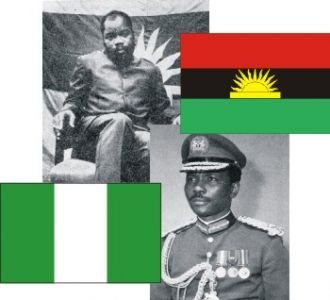This is a war for freedom.
The Nigerian Civil War, also regarded as the Biafran War, 6 July 1967 - 15 January 1970, was a battle fought to counter the secession of Biafra from Nigeria. Biafra represented nationalist aspirations of the Igbo people, whose management felt they ought to no longer coexist with the Northern-dominated federal government.

The fighting resulted from political, economic, ethnic, cultural and religious tensions which preceded Britain's formal decolonization of Nigeria from 1960-1963. Immediate reasons of the combat in 1966 blanketed a army coup, a counter-coup, and persecution of Igbo dwelling in Northern Nigeria. Control over oil manufacturing in the Niger Delta performed a vital strategic role.
Within a year, the Federal Military Government surrounded Biafra, taking pictures coastal oil amenities and the town of Port Harcourt. The blockade imposed throughout the ensuing stalemate led to extreme famine accomplished intentionally as a conflict strategy and described by means of some as a genocide. Over the two and half years of the war, two million civilians died from forced famine and fighting.
.jpeg)
.jpeg)
This famine entered world recognition in mid-1968, when pictures of malnourished and ravenous youngsters all at once saturated the mass media of Western countries. The plight of the ravenous Biafrans became a cause in foreign countries, enabling a great upward jab in the funding and prominence of worldwide non-governmental firms (NGOs).
.jpeg)
Britain and the Soviet Union have been the fundamental backers of the Federal Military Government in Lagos, while France and some impartial elements supported Biafra.
France and Israel provided weapons to each combatants.
.png)
Presently, the biafrains are still agitating and protesting peacefully for her independence.
Okey... Done